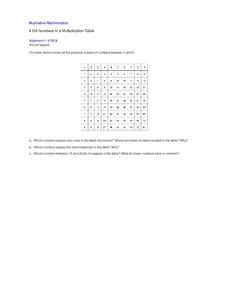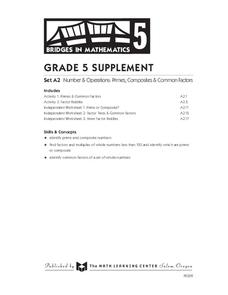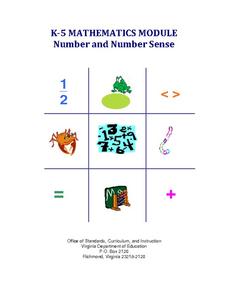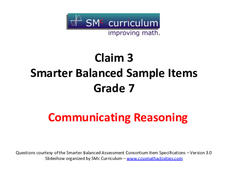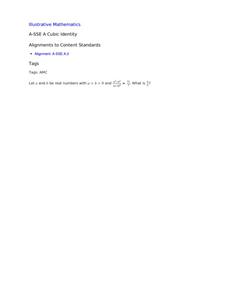Curated OER
Prime Numbers
Remembering which numbers are prime can be a snap if you have a graphic to help you out. As this printable 8x11 image will tell you, a prime is a number which can only be divided by one and itself. Number 1-100 are enclosed in pretty...
Illustrative Mathematics
Numbers in a Multiplication Table
Identifying patterns is a crucial skill for all mathematicians, young and old. Explore the multiplication table with your class, using patterns and symmetry to teach about square numbers, prime numbers, and the commutative and identity...
Scholastic
Study Jams! Prime Factorization
Deepen the number sense of young mathematicians by exploring the process of prime factorization. Follow along with this step-by-step presentation that explains how factor trees are used to break a composite number down into its prime...
Mathed Up!
HCF, LCM, and Product of Primes
Give the class a prime example of using prime numbers. After reviewing prime factorization of numbers with the video, pupils use their knowledge to determine greatest common factors and least common multiples in the worksheet. The...
Scholastic
Study Jams! Prime & Composite Numbers
Prime or composite, that is the question. Teach your class how to find the answer with this step-by-step presentation that defines and provides examples of each type of number. When addressing larger numbers, divisibility rules are...
K20 LEARN
Prime Time
How many prime numbers are there between 1 and 100? By using a prime time resource, your scholars should be able to answer this question. Using arrays, they determine if numbers are prime or composite, and then write a prime...
K12 Reader
Prime or Composite?
Prime numbers? Composite numbers? Prime factorization? After reading a short article about factors and prime and composite numbers, kids answer a series of comprehension questions based on the text.
Math Learning Center
Grade 5 Supplement Set A2 – Number and Operations: Primes, Composites and Common Factors
Incorporate riddles into your math lesson by having students make tree factors and determine if the number is a prime or composite. They will also use other clues to find the answer to the riddle while sharpening their...
Scholastic
Study Jams! Divisibility Rules
Learning division is a challenge for many young mathematicians, but this presentation on divisibility rules can make it much easier. Seven different rules are clearly explained and modeled with the support of multiple examples. Consider...
Curated OER
K-5 Mathematics Module: Number and Number Sense
Reinforce number sense with a collection of math lessons for kindergarteners through fifth graders. Young mathematicians take part in hands-on activities, learning games, and complete skills-based worksheets to enhance proficiency...
McGraw Hill
The Wellness Triangle
Health is not simply the absence of disease or a one-dimensional notion, but is really a combination of physical, emotional, and social components. Discover the wellness triangle, which not only includes signs of health and ways to...
EngageNY
Converting Between Fractions and Decimals Using Equivalent Fractions
Use powers of 10 to convert between fractions and decimals. Pupils convert decimals to fractions by using place values in the 13th installment of a 25-part series. Class members reverse the process and find equivalent fractions with a...
West Contra Costa Unified School District
Simplifying Radicals – Day 1
It doesn't get simpler than this. Scholars first learn to simplify radicals by determining the prime factors of the radicand. The lesson progresses to simplifying radicals involving algebraic expressions in the radicand.
EngageNY
Least Common Multiple and Greatest Common Factor
Find the common denominator between prime factors, factor trees, and the distributive property. Scholars learn to find the least common multiple and greatest common factor of pairs of numbers. They rotate through stations to connect...
Council for Economic Education
A Penny Saved
A penny saved is a penny earned! Scholars research the different ways to save money over a lifetime. They investigate the Rule of 72, compound interest, and sub-prime loans to gain an understanding of how banks aid in the saving process....
American Museum of Natural History
Optical Illusions and How They Work
Illusions are what your mind makes them. Learners view several optical illusions. After each illusion the resource describes what is seen and the potential connection to evolution of the brain. Illusions include seeing different objects...
BrainPOP
Latitude and Longitude Differentiated Lesson Plan
Scholars warm-up their map skills with a discussion using location words to describe familiar places. An engaging video informs class members about latitude and longitude. Three leveled activities extend the learning experience for...
Edline
How Did the Unification of Germany Change the Course of World History?
Here you'll find a nice guided notes learning exercise on Otto von Bismarck, which details Bismarck's plan to unify Germany, as well as asks learners to analyze his motivations and overall impact.
Willow Tree
Factoring Polynomials
Young mathematicians discover trees organize more than just families — they help factor, too. The lesson begins with factor trees and develops slowly to factoring by grouping and special patterns.
CCSS Math Activities
Smarter Balanced Sample Items: 7th Grade Math – Claim 3
Does the explanation make sense? Sample items highlight claim three, communicating reason, in the Smarter Balanced assessments. Teachers use the 16 items to help show pupils the importance of communication and reasoning within...
Charleston School District
Constructing Dilations
Pupils multiply the vertical and horizontal distances from the center of dilation by the scale factor. The independent practice prompts the class to analyze the relationship between the image and pre-image. The lesson is...
Illustrative Mathematics
An Integer Identity
Challenge algebra learners to use the difference of cubes to solve this problem. Once your charges have taken out the factor (a - b), combined the like terms and set them equal to zero, the problem becomes a factorable quadratic...
Other popular searches
- Prime Numbers 100's Chart
- Prime Numbers Chart
- Prime Numbers and Composite
- Prime Factorization Tree
- Composite Prime Numbers
- Math Prime Numbers
- Prime Numbers & Composites
- Listing All Prime Numbers
- Introducing Prime Numbers
- Year 10 Prime Numbers
- Prime Numbers Puzzles
- Prime Numbers and Algebra

